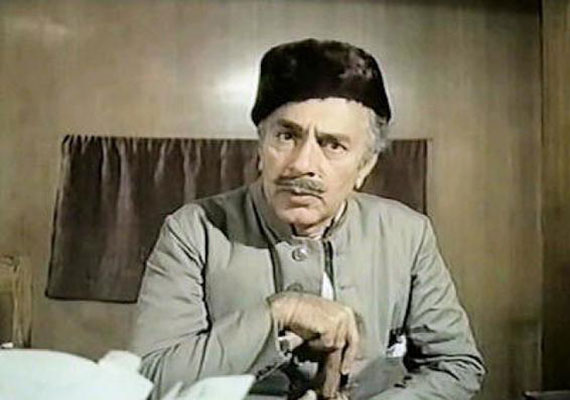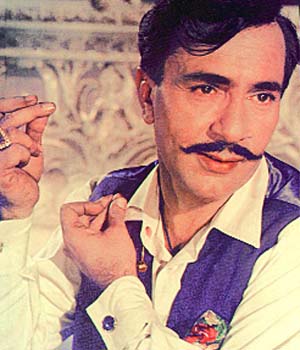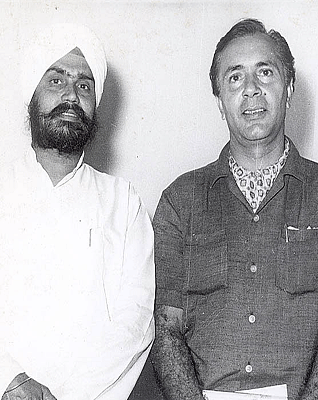Balraj Sahni Biography
source(google.com.pk)
Born On: May 1, 1913
Born In: Rawalpindi, British India
Died On: April 13, 1973
Career: Actor
Nationality: Indian
On the streets of Calcutta, an actor pretending to be a rickshaw puller had other rickshaw puller convinced that he was one of them. This man was Yudhishthir Sahni, popularly known as Balraj Sahni and his talents as an actor cannot be forgotten by those who've seen him act. Such were his skills that he used to get into the skin of the characters he played, leaving the name of Balraj Sahni behind. He was a well educated person, a teacher and a writer. But it was his stint as an actor that made him the name he is today. Many present-day personalities from the film world consider him to be the greatest actor ever in the Hindi Film Industry. Making his debut as an actor in 1946, he went on to prove the same in all the films that followed till 1973.
Early Life
Yudhishthir Sahni aka Balraj Sahni was born in Rawalpindi, Punjab, British India (now Pakistan) on 1st May, 1913 to Punjabi family. After completing his graduation in Bachelor of Arts (Hindi), and post graduation in Masters of Arts (English Literature), both from Punjab University; he got married to Dayamanti. It was in late 1930s that both husband and wife moved to Bengal to join Rabindra Nath Tagore's Visva Bharati University in Shantiniketan as English and Hindi teacher. It was about the same time that in 1936 Balraj wrote his first compilation of Hindi fiction called "Shahzaadon ka Drink". It was also in Bengal that Balraj and Daytamanti's son, Parikshit was born. In 1938, Sahni went to work with Mahatma Gandhi for a year and the very next year went to England to join the British Broadcasting Network's Hindi service as a radio announcer. In 1943, he returned to India.
Film Career
It was in 1946 that Sahni moved to Bombay and joined the Indian People's Theatre Association (IPTA), a group with which he also started his acting career, albeit through plays. In the same year, he bagged a role in the film "Insaf", which marked the beginning of his acting career in Hindi film industry. "Dharti ke Lal" and "Door Chalein" were his next of releases in the same year. It was, however, the film "Do Bigha Zameen" that established his strengths as an actor. The movie was directed by Bimal Roy and came out in 1953; it also won the international prize at the Cannes Film Festival. The film is now considered a classic. In the years that followed, he played many leading roles in commercial films opposite actresses like Nargis, Meena Kumari, Vyjayanthimala, and Nutan in films "Lajwanti" (1958), "Ghar Sansar" (1958), "Satta Bazar" (1959), "Kathputli" (1957), and "Sone Ki Chidiya" (1958) respectively. These films further established his position as a versatile actor.
In the 1961, film "Kabuliwala", written by Tagore, went on to become another of his classic. To prepare for the role, Balraj lived with kabuliwalas in a Bombay suburb. His character roles with strong performances in films like "Haqeeqat" (1964), "Waqt" (1965), "Do Raaste" (1969), "Ek Phool Do Mali" (1969), and "Mere Humsafar" (1970) further left an indelible mark in the film fraternity and fans alike. The legendary song "Ae Meri Zohra Jabeen" from the film "Waqt", picturized on Balraj Sahni and Achala Sachdev is still etched deep in peoples' memories and is loved by the current generation as well. Along with successfully proving his acting prowess, he also displayed exceptional directing skills through the film Lal Batti (1957), where passengers are forced to spend a night together at the railway platform at the time of India's independence. Balraj co-directed this movie along with Krishan Chopra. His performance in the film "Garm Hava" (1973) is considered to be the best, till date. Sadly, this was his last film before his death.
Writing Career
Sahni's writing career begun with "Shahzaadon Ka Drink" that came out in 1936. This was his first compilation of Hindi fiction. He went on to become an esteemed writer in the Punjabi literature. He wrote "Mera Pakistani Safar" shortly after his visit to Pakistan in 1960. After a tour to Soviet Union in 1969, he wrote "Mera Rusi Safarnama". This book also earned him the Soviet Land Nehru Award. He also wrote his autobiography called "Meri Filmy Aatmakatha". Sahni even penned the screenplay for the 1951 released film "Baazi"; starring Dev Anand and directed by Guru Dutt. Apart from this, he wrote a number of poems, short stories, and contributed to the Punjabi magazine Preetlari.
Death
Going through depression for some time after his young daughter Shabnam's untimely death, Balraj Sahni passed away on 13th April, 1973 at the age of 59 following a cardiac arrest. He is survived by his son Parikshit, who is also an actor in the Hindi film industry.
Awards and Honors
Balraj Sahni received Padma Shri Award in 1969.
Balraj Sahni earned the 'Soviet Land Nehru Award for his book Mera Rusi Safarnama in 1969.
Balraj Sahni starrer movie 'Do Bigha Zameen' won the international prize at the Cannes Film Festival in 1953.
Balraj Sahni joined the BBC-London's Hindi service as a radio announcer from 1939-43.
'Punjabi Kala Kender', founded in 1973 at Mumbai by Balraj Sahni, gives away the annual Balraj Sahni Award'.
'All India Artists' Association' also gives away the annual 'Balraj Sahni Award'.
Timeline
1913: Balraj Sahni was born.
1936: Wrote his first compilation of Hindi fiction called Shahzaadon ka Drink.
1939: Went to London to be a radio announcer for BBC London's Hindi service.
1946: Came to Bombay and became a key figure in Indian People's Theatre Association. He also started his film career with the film Insaf.
1947: His wife passed away at a young age.
1953: His film "Do Bigha Zameen" won the international prize at the Cannes Film Festival.
1973: Balraj Sahni died at the age of 60.
Stum

source(google.com.pk)
Born On: May 1, 1913
Born In: Rawalpindi, British India
Died On: April 13, 1973
Career: Actor
Nationality: Indian
On the streets of Calcutta, an actor pretending to be a rickshaw puller had other rickshaw puller convinced that he was one of them. This man was Yudhishthir Sahni, popularly known as Balraj Sahni and his talents as an actor cannot be forgotten by those who've seen him act. Such were his skills that he used to get into the skin of the characters he played, leaving the name of Balraj Sahni behind. He was a well educated person, a teacher and a writer. But it was his stint as an actor that made him the name he is today. Many present-day personalities from the film world consider him to be the greatest actor ever in the Hindi Film Industry. Making his debut as an actor in 1946, he went on to prove the same in all the films that followed till 1973.
Early Life
Yudhishthir Sahni aka Balraj Sahni was born in Rawalpindi, Punjab, British India (now Pakistan) on 1st May, 1913 to Punjabi family. After completing his graduation in Bachelor of Arts (Hindi), and post graduation in Masters of Arts (English Literature), both from Punjab University; he got married to Dayamanti. It was in late 1930s that both husband and wife moved to Bengal to join Rabindra Nath Tagore's Visva Bharati University in Shantiniketan as English and Hindi teacher. It was about the same time that in 1936 Balraj wrote his first compilation of Hindi fiction called "Shahzaadon ka Drink". It was also in Bengal that Balraj and Daytamanti's son, Parikshit was born. In 1938, Sahni went to work with Mahatma Gandhi for a year and the very next year went to England to join the British Broadcasting Network's Hindi service as a radio announcer. In 1943, he returned to India.
Film Career
It was in 1946 that Sahni moved to Bombay and joined the Indian People's Theatre Association (IPTA), a group with which he also started his acting career, albeit through plays. In the same year, he bagged a role in the film "Insaf", which marked the beginning of his acting career in Hindi film industry. "Dharti ke Lal" and "Door Chalein" were his next of releases in the same year. It was, however, the film "Do Bigha Zameen" that established his strengths as an actor. The movie was directed by Bimal Roy and came out in 1953; it also won the international prize at the Cannes Film Festival. The film is now considered a classic. In the years that followed, he played many leading roles in commercial films opposite actresses like Nargis, Meena Kumari, Vyjayanthimala, and Nutan in films "Lajwanti" (1958), "Ghar Sansar" (1958), "Satta Bazar" (1959), "Kathputli" (1957), and "Sone Ki Chidiya" (1958) respectively. These films further established his position as a versatile actor.
In the 1961, film "Kabuliwala", written by Tagore, went on to become another of his classic. To prepare for the role, Balraj lived with kabuliwalas in a Bombay suburb. His character roles with strong performances in films like "Haqeeqat" (1964), "Waqt" (1965), "Do Raaste" (1969), "Ek Phool Do Mali" (1969), and "Mere Humsafar" (1970) further left an indelible mark in the film fraternity and fans alike. The legendary song "Ae Meri Zohra Jabeen" from the film "Waqt", picturized on Balraj Sahni and Achala Sachdev is still etched deep in peoples' memories and is loved by the current generation as well. Along with successfully proving his acting prowess, he also displayed exceptional directing skills through the film Lal Batti (1957), where passengers are forced to spend a night together at the railway platform at the time of India's independence. Balraj co-directed this movie along with Krishan Chopra. His performance in the film "Garm Hava" (1973) is considered to be the best, till date. Sadly, this was his last film before his death.
Writing Career
Sahni's writing career begun with "Shahzaadon Ka Drink" that came out in 1936. This was his first compilation of Hindi fiction. He went on to become an esteemed writer in the Punjabi literature. He wrote "Mera Pakistani Safar" shortly after his visit to Pakistan in 1960. After a tour to Soviet Union in 1969, he wrote "Mera Rusi Safarnama". This book also earned him the Soviet Land Nehru Award. He also wrote his autobiography called "Meri Filmy Aatmakatha". Sahni even penned the screenplay for the 1951 released film "Baazi"; starring Dev Anand and directed by Guru Dutt. Apart from this, he wrote a number of poems, short stories, and contributed to the Punjabi magazine Preetlari.
Death
Going through depression for some time after his young daughter Shabnam's untimely death, Balraj Sahni passed away on 13th April, 1973 at the age of 59 following a cardiac arrest. He is survived by his son Parikshit, who is also an actor in the Hindi film industry.
Awards and Honors
Balraj Sahni received Padma Shri Award in 1969.
Balraj Sahni earned the 'Soviet Land Nehru Award for his book Mera Rusi Safarnama in 1969.
Balraj Sahni starrer movie 'Do Bigha Zameen' won the international prize at the Cannes Film Festival in 1953.
Balraj Sahni joined the BBC-London's Hindi service as a radio announcer from 1939-43.
'Punjabi Kala Kender', founded in 1973 at Mumbai by Balraj Sahni, gives away the annual Balraj Sahni Award'.
'All India Artists' Association' also gives away the annual 'Balraj Sahni Award'.
Timeline
1913: Balraj Sahni was born.
1936: Wrote his first compilation of Hindi fiction called Shahzaadon ka Drink.
1939: Went to London to be a radio announcer for BBC London's Hindi service.
1946: Came to Bombay and became a key figure in Indian People's Theatre Association. He also started his film career with the film Insaf.
1947: His wife passed away at a young age.
1953: His film "Do Bigha Zameen" won the international prize at the Cannes Film Festival.
1973: Balraj Sahni died at the age of 60.
Stum
Balraj Sahni

Balraj Sahni
 Balraj Sahni
Balraj Sahni
 Balraj Sahni
Balraj Sahni
 Balraj Sahni
Balraj Sahni
 Balraj Sahni
Balraj Sahni
 Balraj Sahni
Balraj Sahni
 Balraj Sahni
Balraj Sahni
 Balraj Sahni
Balraj Sahni
 Balraj Sahni
Balraj Sahni
 Balraj Sahni
Balraj Sahni









No comments:
Post a Comment